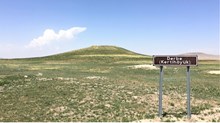How Christians Have Responded to Past Pandemics

Pandemics are not new for the church. Christians in past centuries have also sought to faithfully react and respond to instances of mass infection. Though looking to the past does not necessarily prescribe a current course of action, it does provide important information for reflection today.
To learn more about how the historical church has responded in times of pandemic, we interviewed Bryan Just, who serves as Event & Executive Services Manager at The Center for Bioethics & Human Dignity (CBHD). He graduated with a B.A. in Psychology from Nyack College and an M.A. in Theological Studies from Trinity Evangelical Divinity School, where he is currently pursuing a second M.A. in Church History. His master’s thesis looks at the history of CBHD and its impact on the evangelical bioethics movement. He and his wife, Rebekah, reside in Gurnee, Illinois and attend Village Church of Lincolnshire.
This is part one of our two-part interview with Bryan Just. You can find the next part of the series and all other reopeningthechurch.com blogs here.
JA: Why did you set out to do this research?
BJ: In the words of my colleague, the global pandemic has been a time of “radical dynamic uncertainty.” Especially in the early days, it seemed that every time I checked the news there was some new piece of information or a repudiation of yesterday’s facts. This uncertainly was anxiety-producing and frustrating; it felt very difficult to ground responses in facts, because the facts kept changing. Thus, I became interested in looking backwards in order to ground my own thoughts and responses in the Christian tradition, which has a long track record of dealing with disease and illness. While I recognized that there are huge gaps between the periods I covered and the modern world, the examples of earlier Christians still have a lot to teach us. In fact, because of their distance from the current pandemic, these examples can help us to take a step back and gain some much-needed perspective.
KA: What was the focus of your study?
BJ: Since trying to cover the global church’s approaches to a pandemic over 2,000 years was not going to be possible in a short review article, I decided to limit myself to smaller case studies—how specific Christian communities responded to specific plagues. In the early church, I focused on a few well-known plagues, such as the Cyprian Plague in Carthage. In what may seem like a glaring omission, I do not talk about Christian responses to the bubonic plague, and this is for two reasons. Primary was lack of space and time to delve deeply into that topic, but the second reason is that plague is much more familiar to people, and I wanted to focus on areas that have not received as much attention.
I also include discussion of a plague in Calvin’s Geneva, and this was the result of some serendipitous research. While writing the article, I was also copy-editing a book on Theodore Beza, and I came across some passages referring to the Genevan plagues and Beza’s response. As I looked into this, I realized that the examples of the Genevan pastors would make some excellent comparisons and contrasts to the responses of the early Christians.
JA: What did you discover in your study?
BJ: On the surface level, I found exactly what one might expect—that Christians throughout history have had different ways of approaching care for the sick and Christian duty during times of pandemic. However, another discovery was just how different the ancient world is from the world of today. On one level, the natural response to this is “well, of course!” It is one thing to recognize the differences, however, and another to attempt to really understand them. To have bodies piled in the streets is unimaginable today; when hospitals could not handle the number of bodies and were setting up outdoor areas to house them, Americans were appalled. And yet, having corpses rotting in the street was once considered “normal.”
The current pandemic has led to intense discussions of rationing and allocation of care, but in the ancient world there were no hospitals, no doctors, and no real care to speak of. The very idea of social responsibility for the sick was absent from Roman society. The fact that things are different today is largely due to the influence of Christianity, and part of learning from the examples of the past is understanding just how Christianity changed the basic cultural attitudes towards plagues and their victims.
KA: How might readers apply what you found to their lives?
BJ: My hope and prayer is that readers would be able to use my article to think more deeply about how they as individuals, their local church body, and the larger Christian church should approach pandemic response in the modern world. Too often it seems Christian responses are politically or culturally based rather than biblically or historically grounded. Whether the reader ultimately agrees with my conclusions regarding how to apply past Christian examples, I would love for them to at least have an exposure to examples from earlier periods, and for these to inform, if not shape, their thinking.
Follow Bryan Just on Facebook and LinkedIn.
Also, follow The Center for Bioethics and Human Dignity on Facebook, Twitter, and LinkedIn.
Article Reference: Bryan Just, “Historic Plagues and Christian Responses: Lessons for the Church Today?” Christian Journal for Global Health 7, no. 1 (2020), 7–12. https://journal.cjgh.org/index.php/cjgh/article/view/373.
This post originally appeared at reopeningthechurch.com.
The Better Samaritan is a part of CT's
Blog Forum. Support the work of CT.
Subscribe and get one year free.
The views of the blogger do not necessarily reflect those of Christianity Today.





















